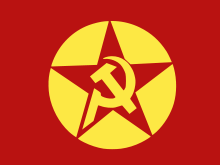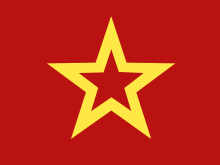- Revolutionary People's Liberation Party–Front
-
The Revolutionary People's Liberation Party-Front, (Turkish: Devrimci Halk Kurtuluş Partisi-Cephesi or DHKP/C) is a Marxist-Leninist party in Turkey.
Contents
History
The organisation was originally formed in 1978 by Dursun Karataş as Revolutionary Left (Turkish: Devrimci Sol or Dev Sol), a splinter faction of Devrimci Yol ("Revolutionary Way", also known as Devrimci Yol), which splintered from the People's Liberation Party-Front of Turkey (THKP-C), which in its turn was a splinter of Revolutionary Youth Federation (commonly known in Turkish as Dev Genç).
A 1994 factional infighting within Dev Sol resulted in two factions: the main group led by Dursun Karatas[citation needed] was renamed DHKP/C, while Bedri Yağan created a new THKP-C (not to be confused with the original one).
In all cases of "Parti-Cephe" (Part-/Front) names, "Party" refers to the group’s political activities, while "Front" is a reference to a group’s military operations. Theoretically they are separate entities.
The group espouses a Marxist-Leninist ideology and holds an anti-U.S., anti-NATO positions. It considers that the Turkish government is under the control of Western imperialism and seeks to destroy this control by violent and democratic means.
It finances its activities chiefly through donations raised in Turkey and Europe.[1]
Activities
Since the late 1980s, the group has targeted primarily current and retired Turkish security and military officials. It began a new campaign against foreign interests in 1990, which included attacks against U.S. military and diplomatic personnel and facilities.
To protest what it describes as US imperialism during the Gulf war, the DHKP/C assassinated two U.S. military personnel, wounded an Air Force officer and bombed more than 20 U.S. and NATO military, commercial and cultural facilities.
It is significant that the only American killed by terrorists during the First Gulf War was a victim of Dev Sol. U.S. Insurance Executive John Gandy was brutally murdered in his Istanbul office in February 1991 by a well-trained Dev Sol hit team that gained access to the office building by wearing Turkish National Police (TNP) uniforms. After tying Gandy to a chair the Dev Sol operatives shot him multiple times in the head. The terrorists then wrote anti-US graffiti on the office walls with the victim's blood.
Although Dev Sol was under active investigation by the American, British, French, Austrian and Danish intelligence and security services, it posed a significant challenge for counterterrorist agents because it was one of the few terrorist organizations (at that time) to employ professional operational and counterintelligence tradecraft. It used sophisticated surveillance and countersurveillance techniques, it employed multi-layer assassination squads with surveillance, primary and secondary shooters, and it successfully exfiltrated its operatives back and forth between Western Europe and Turkey as needed. It skillfully employed professionally forged documents and disguise, and it preyed on innocent Turks living in Europe, extorting money from them in exchange for "protection." Turks who refused to provide pay-offs to Dev Sol were murdered or their businesses were vandalized.
In its next significant act as DHKP/C on January 9, 1996, it assassinated Özdemir Sabancı, a prominent Turkish businessman, and two others: an associate Haluk Görgün and a secretary Nilgün Hasefe. The murders were carried out by hired assassins who had been given access to the Sabanci Towers by a member, the student Fehriye Erdal, working there at that time. DHKP/C later claimed responsibility for the act.
The DHKP/C has not only targeted Turks. On August 13th 1991 it turned its attention to foreign businessmen, with the murder of Andrew Blake, the head of British Commercial Union in Istanbul.
DHKP/C added suicide bombings to its operations in 2001, with attacks against Turkish police in January and September of that year.
Security operations in Turkey and elsewhere have weakened the group, however. DHKP-C did not conduct any major attacks in 2003, although a DHKP/C female suicide bomber Sengul Akkurt's explosive belt detonated by accident on May 20, 2003 in Ankara, in a restroom, while she was preparing for an action.
On July 24, 2004, another mistaken detonation, on a bus in Istanbul, occurred, killing Semiran Polat of DHKP-C and three more people and injuring 15 others.
On July 1, 2005, Eyüp Beyaz of DHKP-C was killed in Ankara in an attempted suicide bombing attack on the ministry of justice.
In late February 2006, female member Fehriye Erdal was convicted in Belgium, while under house arrest.[citation needed] However, shortly before her conviction she escaped and still hasn't been found.
On April 29, 2009, Didem Akman of DHKP-C was wounded in her attempt to assassinate Hikmet Sami Türk at Bilkent University right before a lecture in Constitution Law. Akman and her accomplice S. Onur Yılmaz were caught[2].
Designation as a Terrorist Organisation
The organisation is listed among the 12 active terrorist organisation in Turkey as of 2007 according to Counter-Terrorism and Operations Department of Directorate General for Security (Turkish police).[3]
It also appears as one of the 44 names in the current U.S. State Department list of Foreign Terrorist Organizations,[4] 48 groups and entities to which European Union's Common Position 2001/931/CFSP on the application of specific measures to combat terrorism applies[5] and 45 international terrorist organisations in the list of Proscribed Terrorist Groups of the UK Home Office.[6]
Human Resources
Information provided by the Intelligence Resource Program of the Federation of American Scientists based on the 2003 Patterns of Global Terrorism report suggests that the organisation has several dozen operatives within Turkey and a large support network in Europe.[7]
A study carried out by the Counter-Terrorism and Operations Department of Directorate General for Security over a sample of files about people convicted of being a terrorist under Turkish laws including 826 militants from the organisation and the three other currently active left-wing organisations (see reference 1) 65 % of the members are aged 14 to 25, 16,8 % 25 to 30 and 17,5 % are older than 30. University graduates make up 20,4 % of the members, high school graduates 33,5 %, secondary school graduates 14 %, primary school graduates 29,9 % and illiterates 1,9 % (while they have no sampled literate non-graduate members).[8]
References
- ^ http://www.nctc.gov/site/groups/dhkpc.html
- ^ Today's Zaman (2009-04-30). "Former justice minister escapes assassination attempt". http://www.todayszaman.com/tz-web/detaylar.do?load=detay&link=173888. Retrieved 2009-04-30.
- ^ "TÜRKİYE'DE HALEN FAALİYETLERİNE DEVAM EDEN BAŞLICA TERÖR ÖRGÜTLERİ". Terörle Mücadele ve Harekat Dairesi Başkanlığı. 2005-01-27. http://www.egm.gov.tr/temuh/terorgrup1.html. Retrieved 2008-08-15.
- ^ Office of the Coordinator for Counterterrorism (2008-04-08). "Foreign Terrorist Organizations". U.S. Department of State. Archived from the original on 2008-08-05. http://web.archive.org/web/20080805033811/http://www.state.gov/s/ct/rls/fs/08/103392.htm. Retrieved 2008-08-15.
- ^ Council Common Position 2008/586/CFSP updating Common Position 2001/931/CFSP on the application of specific measures to combat terrorism and repealing Common Position 2007/871/CFSPPDF (52.3 KB), Official Journal of the European Union L 188/71, 2008-07-16
- ^ Communications Directorate (2005-10-04). "Proscribed terrorist groups". Terrorism Act 2000. Home Office. http://www.homeoffice.gov.uk/security/terrorism-and-the-law/terrorism-act/proscribed-groups. Retrieved 2008-08-15.
- ^ Pike, John (2004-05-21). "Revolutionary People's Liberation Party/Front (DHKP/C)". Federation of American Scientists. http://fas.org/irp/world/para/dev_sol.htm. Retrieved 2008-08-15.
- ^ "Polisten terörist profili: Yaşları ve eğitim ortalamaları düşük" (in Turkish). Anadolu Ajansi. Zaman. 2007-12-25. http://zaman.com.tr/haber.do?haberno=628867&keyfield=4D616F697374204B6F6DC3BC6E6973742050617274697369. Retrieved 2008-08-15.
See also
External links
- Revolutionary People's Liberation Front (English) (Turkish) (French) (German) (Arabic)
Categories:- Irregular military
- Communist parties in Turkey
- Suicide bombing
- Crime in Turkey
- Political parties established in 1978
- Organizations designated as terrorist by the United States government
- European Union designated terrorist organizations
- United Kingdom Home Office designated terrorist groups
- Organizations designated as terrorist by the Turkish Directorate General for Security
- Organizations designated as terrorist in Asia
Wikimedia Foundation. 2010.


